Analysis of Traditional and Contemporary Management Principles
VerifiedAdded on 2023/06/18
|6
|1304
|468
Essay
AI Summary
This essay provides a comparative analysis of traditional and contemporary management approaches, highlighting their evolution, key characteristics, similarities, and differences. It delves into traditional approaches like scientific management and human relations theory, contrasting them with modern approaches such as contingency theory. The essay also reflects on the impact of tutor feedback, identifying areas for improvement in writing skills and knowledge of business analysis tools like PESTLE and SWOT. The conclusion emphasizes the importance of understanding both approaches for effective organizational management and personal development. Desklib offers more resources for students seeking to improve their understanding of business and management concepts.
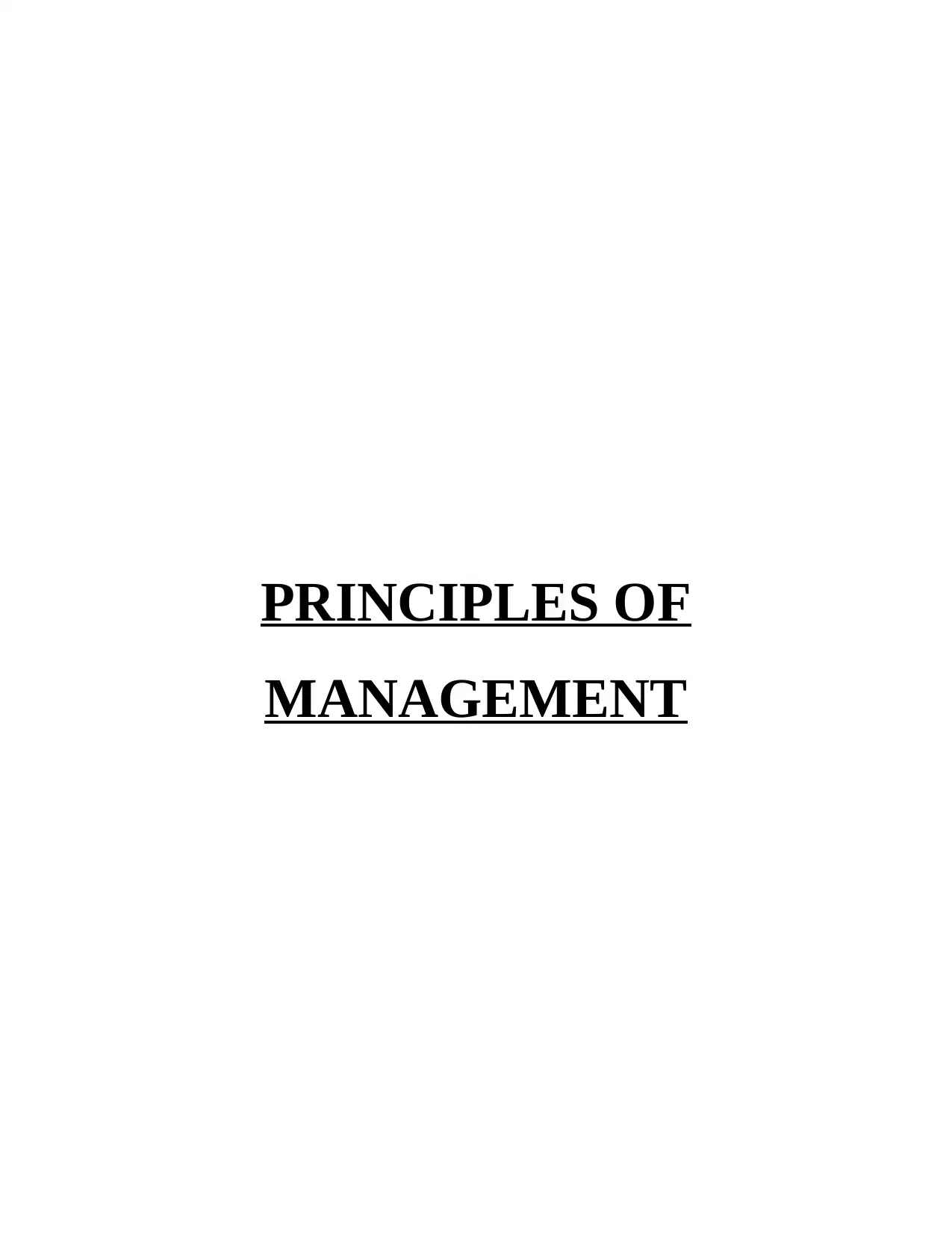
PRINCIPLES OF
MANAGEMENT
MANAGEMENT
Paraphrase This Document
Need a fresh take? Get an instant paraphrase of this document with our AI Paraphraser
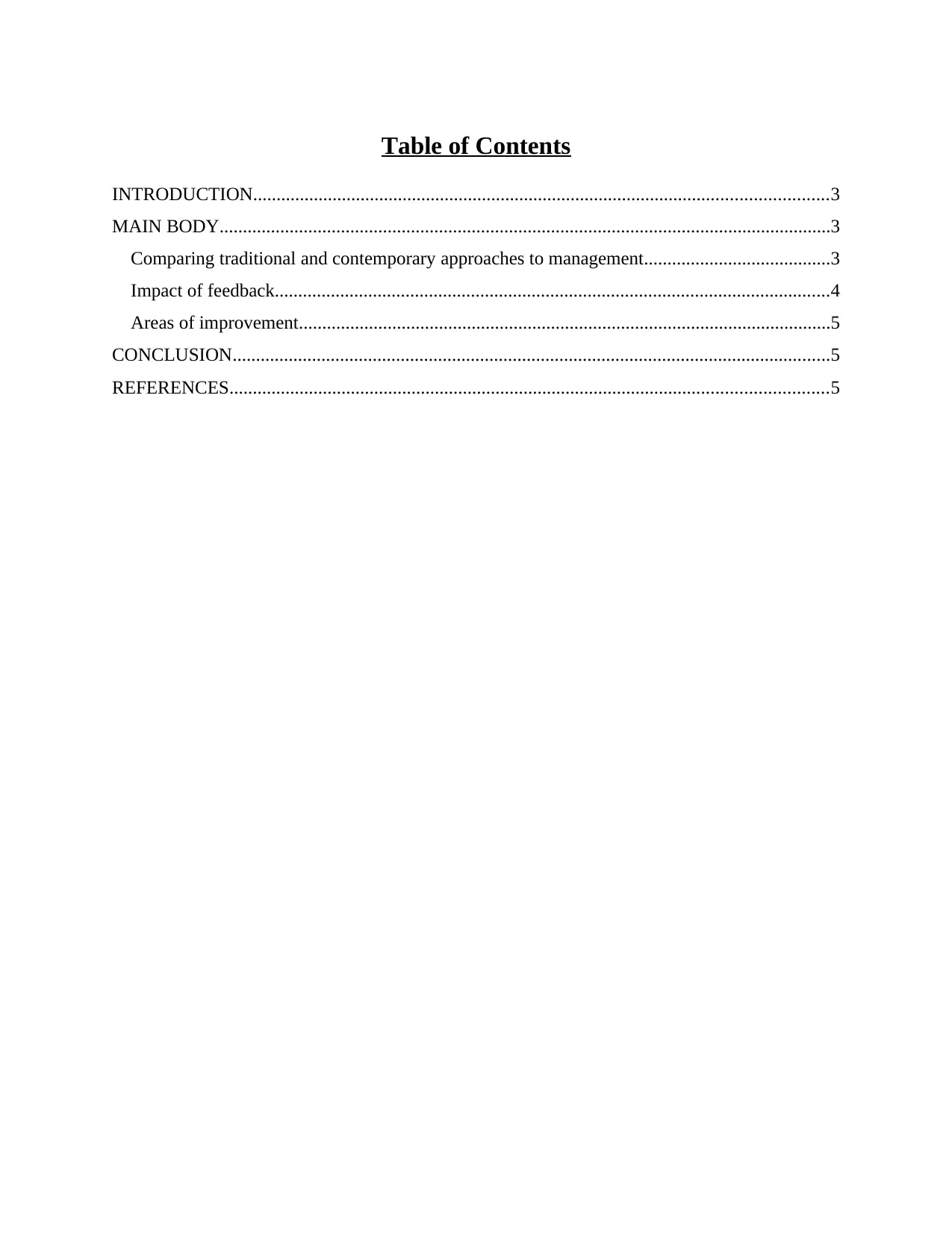
Table of Contents
INTRODUCTION...........................................................................................................................3
MAIN BODY...................................................................................................................................3
Comparing traditional and contemporary approaches to management........................................3
Impact of feedback.......................................................................................................................4
Areas of improvement..................................................................................................................5
CONCLUSION................................................................................................................................5
REFERENCES................................................................................................................................5
INTRODUCTION...........................................................................................................................3
MAIN BODY...................................................................................................................................3
Comparing traditional and contemporary approaches to management........................................3
Impact of feedback.......................................................................................................................4
Areas of improvement..................................................................................................................5
CONCLUSION................................................................................................................................5
REFERENCES................................................................................................................................5
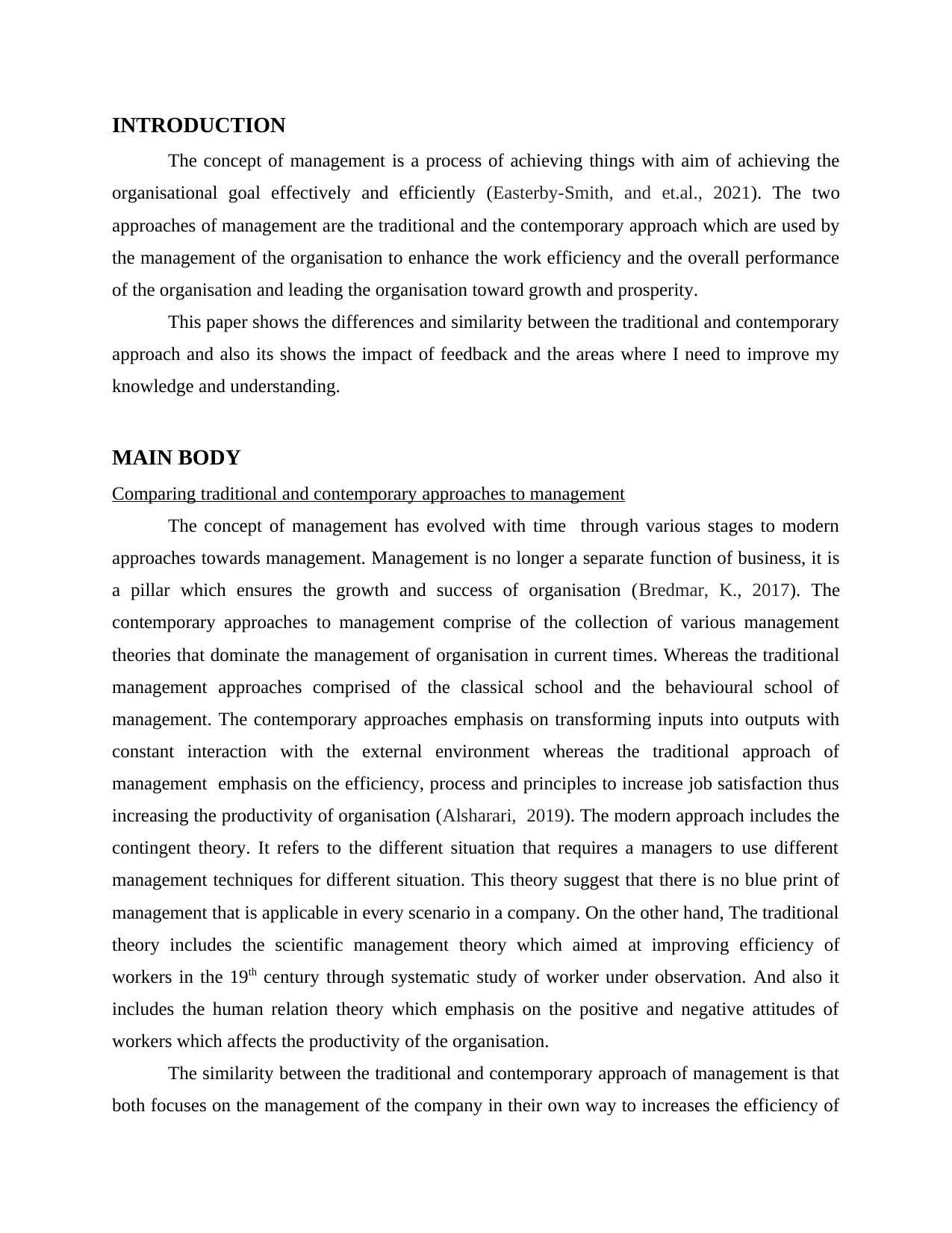
INTRODUCTION
The concept of management is a process of achieving things with aim of achieving the
organisational goal effectively and efficiently (Easterby-Smith, and et.al., 2021). The two
approaches of management are the traditional and the contemporary approach which are used by
the management of the organisation to enhance the work efficiency and the overall performance
of the organisation and leading the organisation toward growth and prosperity.
This paper shows the differences and similarity between the traditional and contemporary
approach and also its shows the impact of feedback and the areas where I need to improve my
knowledge and understanding.
MAIN BODY
Comparing traditional and contemporary approaches to management
The concept of management has evolved with time through various stages to modern
approaches towards management. Management is no longer a separate function of business, it is
a pillar which ensures the growth and success of organisation (Bredmar, K., 2017). The
contemporary approaches to management comprise of the collection of various management
theories that dominate the management of organisation in current times. Whereas the traditional
management approaches comprised of the classical school and the behavioural school of
management. The contemporary approaches emphasis on transforming inputs into outputs with
constant interaction with the external environment whereas the traditional approach of
management emphasis on the efficiency, process and principles to increase job satisfaction thus
increasing the productivity of organisation (Alsharari, 2019). The modern approach includes the
contingent theory. It refers to the different situation that requires a managers to use different
management techniques for different situation. This theory suggest that there is no blue print of
management that is applicable in every scenario in a company. On the other hand, The traditional
theory includes the scientific management theory which aimed at improving efficiency of
workers in the 19th century through systematic study of worker under observation. And also it
includes the human relation theory which emphasis on the positive and negative attitudes of
workers which affects the productivity of the organisation.
The similarity between the traditional and contemporary approach of management is that
both focuses on the management of the company in their own way to increases the efficiency of
The concept of management is a process of achieving things with aim of achieving the
organisational goal effectively and efficiently (Easterby-Smith, and et.al., 2021). The two
approaches of management are the traditional and the contemporary approach which are used by
the management of the organisation to enhance the work efficiency and the overall performance
of the organisation and leading the organisation toward growth and prosperity.
This paper shows the differences and similarity between the traditional and contemporary
approach and also its shows the impact of feedback and the areas where I need to improve my
knowledge and understanding.
MAIN BODY
Comparing traditional and contemporary approaches to management
The concept of management has evolved with time through various stages to modern
approaches towards management. Management is no longer a separate function of business, it is
a pillar which ensures the growth and success of organisation (Bredmar, K., 2017). The
contemporary approaches to management comprise of the collection of various management
theories that dominate the management of organisation in current times. Whereas the traditional
management approaches comprised of the classical school and the behavioural school of
management. The contemporary approaches emphasis on transforming inputs into outputs with
constant interaction with the external environment whereas the traditional approach of
management emphasis on the efficiency, process and principles to increase job satisfaction thus
increasing the productivity of organisation (Alsharari, 2019). The modern approach includes the
contingent theory. It refers to the different situation that requires a managers to use different
management techniques for different situation. This theory suggest that there is no blue print of
management that is applicable in every scenario in a company. On the other hand, The traditional
theory includes the scientific management theory which aimed at improving efficiency of
workers in the 19th century through systematic study of worker under observation. And also it
includes the human relation theory which emphasis on the positive and negative attitudes of
workers which affects the productivity of the organisation.
The similarity between the traditional and contemporary approach of management is that
both focuses on the management of the company in their own way to increases the efficiency of
⊘ This is a preview!⊘
Do you want full access?
Subscribe today to unlock all pages.

Trusted by 1+ million students worldwide
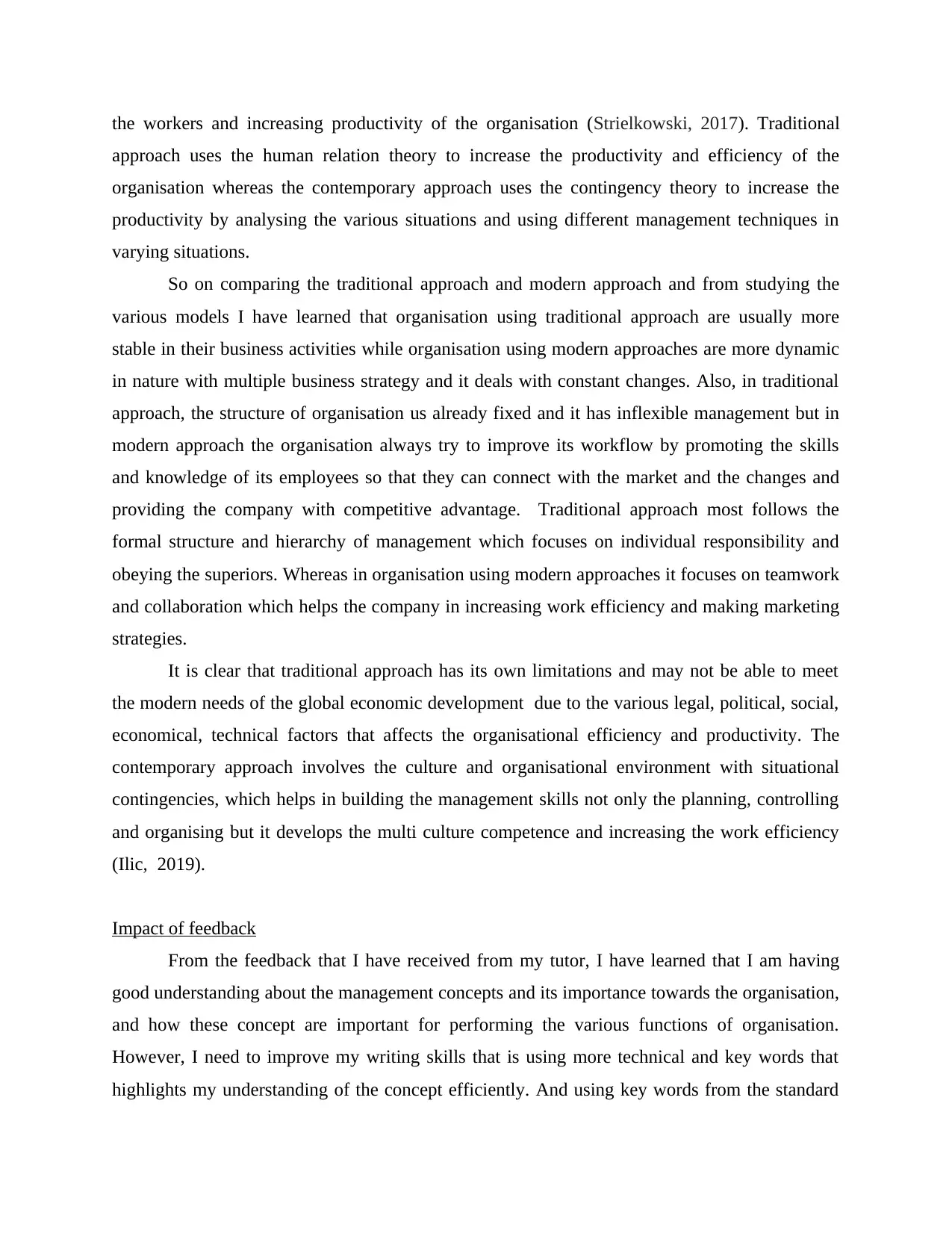
the workers and increasing productivity of the organisation (Strielkowski, 2017). Traditional
approach uses the human relation theory to increase the productivity and efficiency of the
organisation whereas the contemporary approach uses the contingency theory to increase the
productivity by analysing the various situations and using different management techniques in
varying situations.
So on comparing the traditional approach and modern approach and from studying the
various models I have learned that organisation using traditional approach are usually more
stable in their business activities while organisation using modern approaches are more dynamic
in nature with multiple business strategy and it deals with constant changes. Also, in traditional
approach, the structure of organisation us already fixed and it has inflexible management but in
modern approach the organisation always try to improve its workflow by promoting the skills
and knowledge of its employees so that they can connect with the market and the changes and
providing the company with competitive advantage. Traditional approach most follows the
formal structure and hierarchy of management which focuses on individual responsibility and
obeying the superiors. Whereas in organisation using modern approaches it focuses on teamwork
and collaboration which helps the company in increasing work efficiency and making marketing
strategies.
It is clear that traditional approach has its own limitations and may not be able to meet
the modern needs of the global economic development due to the various legal, political, social,
economical, technical factors that affects the organisational efficiency and productivity. The
contemporary approach involves the culture and organisational environment with situational
contingencies, which helps in building the management skills not only the planning, controlling
and organising but it develops the multi culture competence and increasing the work efficiency
(Ilic, 2019).
Impact of feedback
From the feedback that I have received from my tutor, I have learned that I am having
good understanding about the management concepts and its importance towards the organisation,
and how these concept are important for performing the various functions of organisation.
However, I need to improve my writing skills that is using more technical and key words that
highlights my understanding of the concept efficiently. And using key words from the standard
approach uses the human relation theory to increase the productivity and efficiency of the
organisation whereas the contemporary approach uses the contingency theory to increase the
productivity by analysing the various situations and using different management techniques in
varying situations.
So on comparing the traditional approach and modern approach and from studying the
various models I have learned that organisation using traditional approach are usually more
stable in their business activities while organisation using modern approaches are more dynamic
in nature with multiple business strategy and it deals with constant changes. Also, in traditional
approach, the structure of organisation us already fixed and it has inflexible management but in
modern approach the organisation always try to improve its workflow by promoting the skills
and knowledge of its employees so that they can connect with the market and the changes and
providing the company with competitive advantage. Traditional approach most follows the
formal structure and hierarchy of management which focuses on individual responsibility and
obeying the superiors. Whereas in organisation using modern approaches it focuses on teamwork
and collaboration which helps the company in increasing work efficiency and making marketing
strategies.
It is clear that traditional approach has its own limitations and may not be able to meet
the modern needs of the global economic development due to the various legal, political, social,
economical, technical factors that affects the organisational efficiency and productivity. The
contemporary approach involves the culture and organisational environment with situational
contingencies, which helps in building the management skills not only the planning, controlling
and organising but it develops the multi culture competence and increasing the work efficiency
(Ilic, 2019).
Impact of feedback
From the feedback that I have received from my tutor, I have learned that I am having
good understanding about the management concepts and its importance towards the organisation,
and how these concept are important for performing the various functions of organisation.
However, I need to improve my writing skills that is using more technical and key words that
highlights my understanding of the concept efficiently. And using key words from the standard
Paraphrase This Document
Need a fresh take? Get an instant paraphrase of this document with our AI Paraphraser
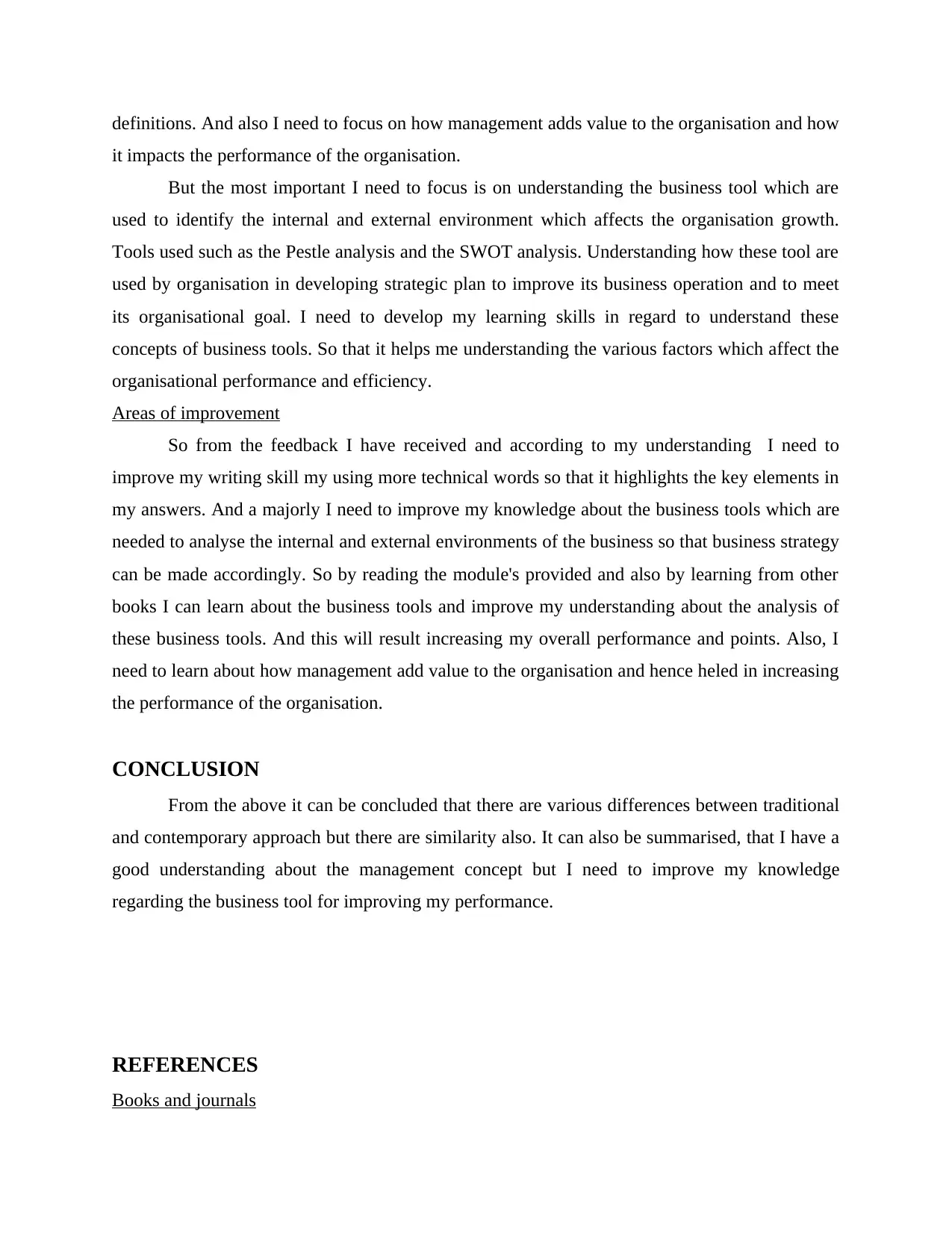
definitions. And also I need to focus on how management adds value to the organisation and how
it impacts the performance of the organisation.
But the most important I need to focus is on understanding the business tool which are
used to identify the internal and external environment which affects the organisation growth.
Tools used such as the Pestle analysis and the SWOT analysis. Understanding how these tool are
used by organisation in developing strategic plan to improve its business operation and to meet
its organisational goal. I need to develop my learning skills in regard to understand these
concepts of business tools. So that it helps me understanding the various factors which affect the
organisational performance and efficiency.
Areas of improvement
So from the feedback I have received and according to my understanding I need to
improve my writing skill my using more technical words so that it highlights the key elements in
my answers. And a majorly I need to improve my knowledge about the business tools which are
needed to analyse the internal and external environments of the business so that business strategy
can be made accordingly. So by reading the module's provided and also by learning from other
books I can learn about the business tools and improve my understanding about the analysis of
these business tools. And this will result increasing my overall performance and points. Also, I
need to learn about how management add value to the organisation and hence heled in increasing
the performance of the organisation.
CONCLUSION
From the above it can be concluded that there are various differences between traditional
and contemporary approach but there are similarity also. It can also be summarised, that I have a
good understanding about the management concept but I need to improve my knowledge
regarding the business tool for improving my performance.
REFERENCES
Books and journals
it impacts the performance of the organisation.
But the most important I need to focus is on understanding the business tool which are
used to identify the internal and external environment which affects the organisation growth.
Tools used such as the Pestle analysis and the SWOT analysis. Understanding how these tool are
used by organisation in developing strategic plan to improve its business operation and to meet
its organisational goal. I need to develop my learning skills in regard to understand these
concepts of business tools. So that it helps me understanding the various factors which affect the
organisational performance and efficiency.
Areas of improvement
So from the feedback I have received and according to my understanding I need to
improve my writing skill my using more technical words so that it highlights the key elements in
my answers. And a majorly I need to improve my knowledge about the business tools which are
needed to analyse the internal and external environments of the business so that business strategy
can be made accordingly. So by reading the module's provided and also by learning from other
books I can learn about the business tools and improve my understanding about the analysis of
these business tools. And this will result increasing my overall performance and points. Also, I
need to learn about how management add value to the organisation and hence heled in increasing
the performance of the organisation.
CONCLUSION
From the above it can be concluded that there are various differences between traditional
and contemporary approach but there are similarity also. It can also be summarised, that I have a
good understanding about the management concept but I need to improve my knowledge
regarding the business tool for improving my performance.
REFERENCES
Books and journals
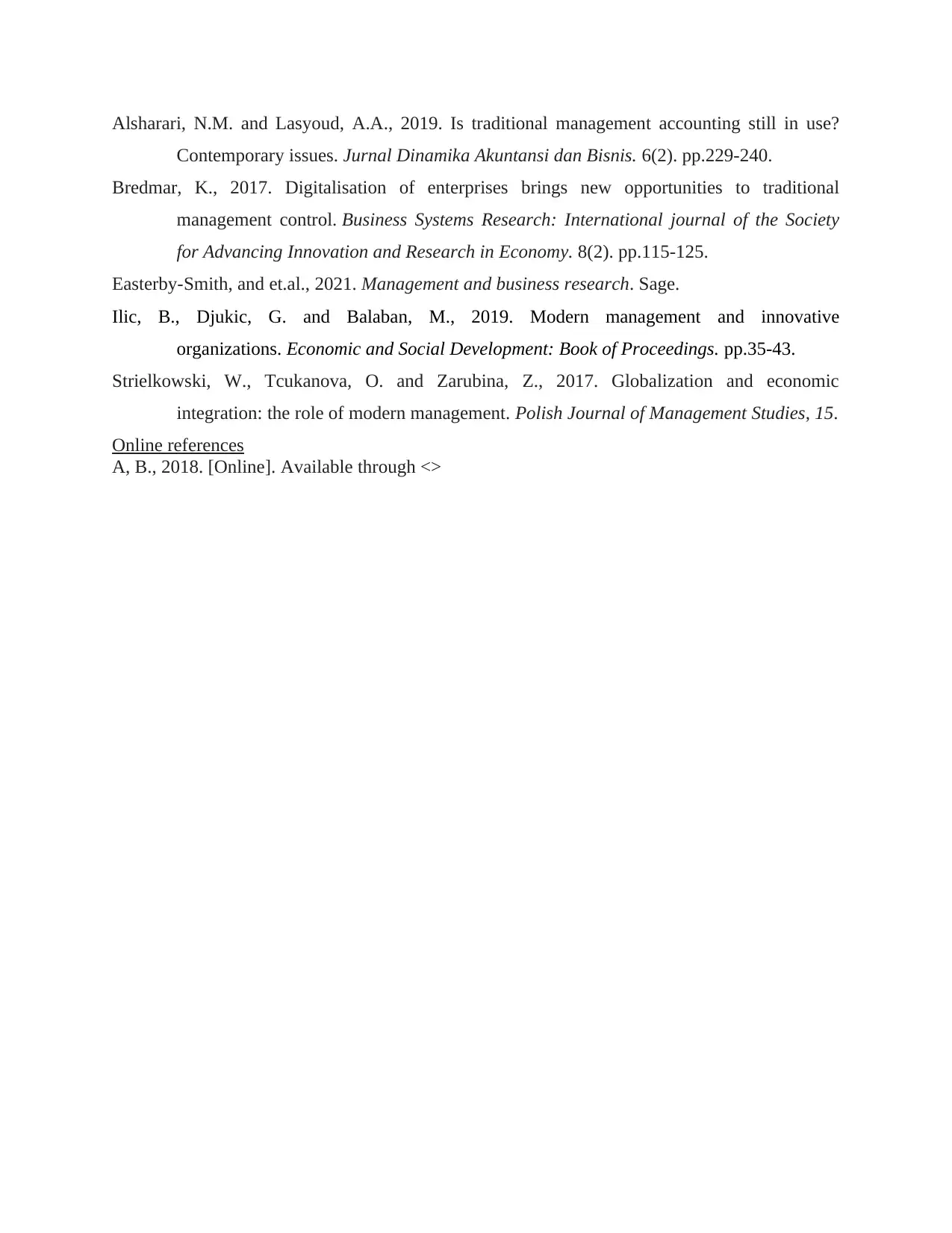
Alsharari, N.M. and Lasyoud, A.A., 2019. Is traditional management accounting still in use?
Contemporary issues. Jurnal Dinamika Akuntansi dan Bisnis. 6(2). pp.229-240.
Bredmar, K., 2017. Digitalisation of enterprises brings new opportunities to traditional
management control. Business Systems Research: International journal of the Society
for Advancing Innovation and Research in Economy. 8(2). pp.115-125.
Easterby-Smith, and et.al., 2021. Management and business research. Sage.
Ilic, B., Djukic, G. and Balaban, M., 2019. Modern management and innovative
organizations. Economic and Social Development: Book of Proceedings. pp.35-43.
Strielkowski, W., Tcukanova, O. and Zarubina, Z., 2017. Globalization and economic
integration: the role of modern management. Polish Journal of Management Studies, 15.
Online references
A, B., 2018. [Online]. Available through <>
Contemporary issues. Jurnal Dinamika Akuntansi dan Bisnis. 6(2). pp.229-240.
Bredmar, K., 2017. Digitalisation of enterprises brings new opportunities to traditional
management control. Business Systems Research: International journal of the Society
for Advancing Innovation and Research in Economy. 8(2). pp.115-125.
Easterby-Smith, and et.al., 2021. Management and business research. Sage.
Ilic, B., Djukic, G. and Balaban, M., 2019. Modern management and innovative
organizations. Economic and Social Development: Book of Proceedings. pp.35-43.
Strielkowski, W., Tcukanova, O. and Zarubina, Z., 2017. Globalization and economic
integration: the role of modern management. Polish Journal of Management Studies, 15.
Online references
A, B., 2018. [Online]. Available through <>
⊘ This is a preview!⊘
Do you want full access?
Subscribe today to unlock all pages.

Trusted by 1+ million students worldwide
1 out of 6
Related Documents
Your All-in-One AI-Powered Toolkit for Academic Success.
+13062052269
info@desklib.com
Available 24*7 on WhatsApp / Email
![[object Object]](/_next/static/media/star-bottom.7253800d.svg)
Unlock your academic potential
Copyright © 2020–2025 A2Z Services. All Rights Reserved. Developed and managed by ZUCOL.





